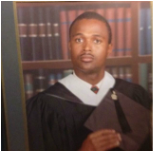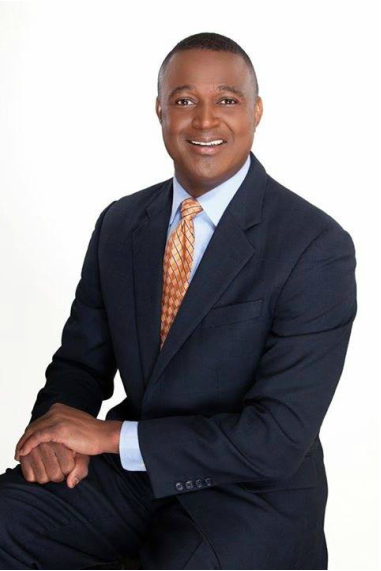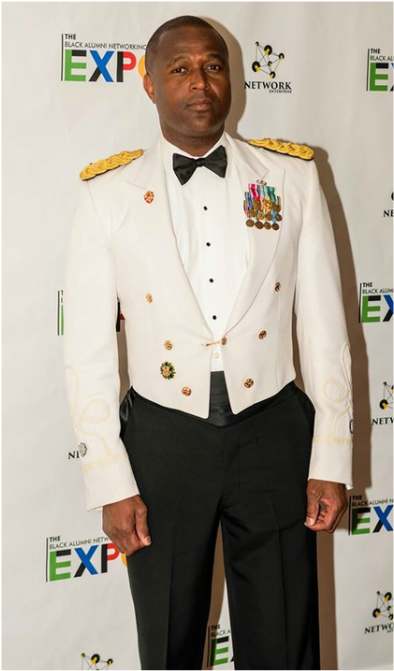A Father, a businessman and a leader: Warren Christopher
Part One: Warren Christopher from Birth to Commissioned Officer
(1967 – 2011)
Early Life
(1967 – 2011)
Early Life
By Darise Deal

Copa: When and where were you born?
Christopher: I was born in Holy Trinity, Alabama in a small city outside Russell County, Alabama. I was born on a family farm and delivered by my grandmother. Based on accounts from my grandmother, I was abandoned by my mother at birth. My grandparents raised me.
Christopher: I was born in Holy Trinity, Alabama in a small city outside Russell County, Alabama. I was born on a family farm and delivered by my grandmother. Based on accounts from my grandmother, I was abandoned by my mother at birth. My grandparents raised me.
Copa: Did you have a traditional upbringing and how did that affect you?
Christopher: No, I did not have a traditional upbringing in a sense that we understand today. I did not grow up with an actual mom and dad or with siblings. I had a traditional upbringing from a perspective of guardians and people who loved me who would provide me with shelter and food. Also, from a work ethic, character, integrity, and loyalty perspective (even from a religious and educational perspective), I had a traditional upbringing. My grandmother was about family. She had 13 children to include my mother, who was the eldest of the children. So I was considered the 14th child, not by birth, but by rearing.
Christopher: No, I did not have a traditional upbringing in a sense that we understand today. I did not grow up with an actual mom and dad or with siblings. I had a traditional upbringing from a perspective of guardians and people who loved me who would provide me with shelter and food. Also, from a work ethic, character, integrity, and loyalty perspective (even from a religious and educational perspective), I had a traditional upbringing. My grandmother was about family. She had 13 children to include my mother, who was the eldest of the children. So I was considered the 14th child, not by birth, but by rearing.
Copa: What are the one or two things your grandmother taught you, that stick with you today?
Warren: Treat folks as they ought to be treated – with dignity and respect. Take God everywhere you go. Work hard and be about your business as a man. My grandmother was certainly the matriarch of the family, and her and my grandfather had been married for many years. My grandfather used to tell me, “You can’t control a lot of things in this world, but you can control your words. So let your words be your bond.”
I was named Warren after my grandfather. So those are things that I really live with today. I do my best and try to treat people as they ought to be treated – with dignity and respect. Like my grandmother, family is hugely important to me. I really try to be about my word. I don’t always get it right every day, but I try.
Warren: Treat folks as they ought to be treated – with dignity and respect. Take God everywhere you go. Work hard and be about your business as a man. My grandmother was certainly the matriarch of the family, and her and my grandfather had been married for many years. My grandfather used to tell me, “You can’t control a lot of things in this world, but you can control your words. So let your words be your bond.”
I was named Warren after my grandfather. So those are things that I really live with today. I do my best and try to treat people as they ought to be treated – with dignity and respect. Like my grandmother, family is hugely important to me. I really try to be about my word. I don’t always get it right every day, but I try.
Copa: What was it like to grow up in Alabama? Do you go back frequently?
Christopher: I didn’t like growing up in Alabama, and I don’t have good childhood memories because although my grandmother provided me with love, my grandfather died when I was 7 years old. I still had aunts at the house. Based on accounts from my aunts and my grandmother, my mother didn’t want me because she had had an extramarital affair. My grandfather was the son of a Caucasian man – he had very fair skin – and so did all of his children, including my mother. So I was made fun of in my own family about having darker skin than everyone else. Also, I did not like getting out of school for the summer. I lived so far out in the country, three miles off of a country road, and there were no kids in the area. Occasionally, my grandmother’s brother would have his grandson come over to our home, and we were somewhat playmates. The only things I did was work on the farm, go to church and go to school.
Believe it or not, I was in the Army before I actually went on my first date. So I don’t go back to Alabama very often because the one other person who was very special to me outside of my grandmother, Aunt Fae, passed away in 2010. I went back then for the funeral, and I haven’t been back since. There is too much pain associated with Alabama.
Christopher: I didn’t like growing up in Alabama, and I don’t have good childhood memories because although my grandmother provided me with love, my grandfather died when I was 7 years old. I still had aunts at the house. Based on accounts from my aunts and my grandmother, my mother didn’t want me because she had had an extramarital affair. My grandfather was the son of a Caucasian man – he had very fair skin – and so did all of his children, including my mother. So I was made fun of in my own family about having darker skin than everyone else. Also, I did not like getting out of school for the summer. I lived so far out in the country, three miles off of a country road, and there were no kids in the area. Occasionally, my grandmother’s brother would have his grandson come over to our home, and we were somewhat playmates. The only things I did was work on the farm, go to church and go to school.
Believe it or not, I was in the Army before I actually went on my first date. So I don’t go back to Alabama very often because the one other person who was very special to me outside of my grandmother, Aunt Fae, passed away in 2010. I went back then for the funeral, and I haven’t been back since. There is too much pain associated with Alabama.
Copa: As a little boy, what did you want to be when you grew up?
Christopher: When you are in a quiet place and you’re the only one around day in and day out, it is difficult. I’m certainly not feeling sorry for myself. I used to pray daily on that farm in Alabama because I was down there by myself. I would pray to God: “Lord I want to be a soldier. I want to be a dad.” I also remember praying that I wanted to be the President of the United States of America. At that time, I didn’t even understand how many states there were. I had no clue about what being the President of the United States was all about, but I was just so fascinated. At that point, I didn’t realize that my life would be entangled with politics. So now, I can say I’ve been blessed with being a father, a career soldier, and I’m just excited about what God continues to do in my life. I think there is a horrible connotation associated with the word “politics” or “politician.” I’m not seeking to be a politician. I want to continue to be a servant leader, an elected official.
Christopher: When you are in a quiet place and you’re the only one around day in and day out, it is difficult. I’m certainly not feeling sorry for myself. I used to pray daily on that farm in Alabama because I was down there by myself. I would pray to God: “Lord I want to be a soldier. I want to be a dad.” I also remember praying that I wanted to be the President of the United States of America. At that time, I didn’t even understand how many states there were. I had no clue about what being the President of the United States was all about, but I was just so fascinated. At that point, I didn’t realize that my life would be entangled with politics. So now, I can say I’ve been blessed with being a father, a career soldier, and I’m just excited about what God continues to do in my life. I think there is a horrible connotation associated with the word “politics” or “politician.” I’m not seeking to be a politician. I want to continue to be a servant leader, an elected official.
Copa: Did you have any key mentors or people in your childhood who deeply influenced who you are?
Christopher: Treat folks as they ought to be treated – with dignity and respect. Take God everywhere you go. Work hard and be about your business as a man. My grandmother was certainly the matriarch of the family, and her and my grandfather had been married for many years. My grandfather used to tell me, “You can’t control a lot of things in this world, but you can control your words. So let your words be your bond.”
Christopher: Treat folks as they ought to be treated – with dignity and respect. Take God everywhere you go. Work hard and be about your business as a man. My grandmother was certainly the matriarch of the family, and her and my grandfather had been married for many years. My grandfather used to tell me, “You can’t control a lot of things in this world, but you can control your words. So let your words be your bond.”
Military Service & Education
Copa: You went into the military. What branch? Why? When? What was your specialty as an enlisted soldier?
Christopher: I enlisted in the Army in December of 1986. That was my initial term. I was in the Delayed Entry Program. I served from 1986-1989. I was awarded a scholarship called the Agreed to Go Scholarship from the United States Army to attend Purdue University. I was commissioned in the Army from May 1982 through February 2011. In total, I competed more than 24 years of service in the Army. My initial job in the army was as a legal assistant. Later I became commissioned in the area of Field Artillery. I wanted to be a combat soldier on the ground where the action was.
Christopher: I enlisted in the Army in December of 1986. That was my initial term. I was in the Delayed Entry Program. I served from 1986-1989. I was awarded a scholarship called the Agreed to Go Scholarship from the United States Army to attend Purdue University. I was commissioned in the Army from May 1982 through February 2011. In total, I competed more than 24 years of service in the Army. My initial job in the army was as a legal assistant. Later I became commissioned in the area of Field Artillery. I wanted to be a combat soldier on the ground where the action was.
Part 2 Coming Thursday November 12, 2015
~Copa


